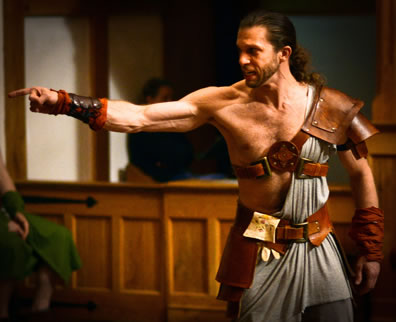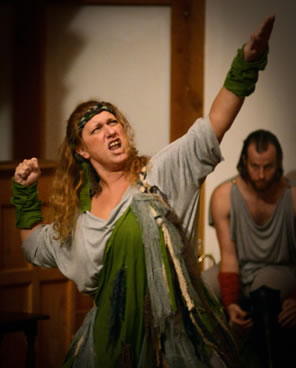Troilus and Cressida
A Play for All Ages Needs An Age to Play In
American Shakespeare Center, Blackfriars Playhouse, Staunton, Va.
Friday, September 27, 2013, C–6&7 (center stalls)
Directed by Jim Warren

Gregory Jon Phelps as Troilus wearing the favor of Cressida, a glove, in his belt before going into battle in the American Shakespeare Center's production of Troilus and Cressida at the Blackfriars Playhouse. Photo by Pat Jarrett, American Shakespeare Center.
One of the knocks on William Shakespeare is that he's too cerebral. Guys who like their action and gals who like their romance unencumbered don't want to "work" at understanding Shakespeare's Elizabethan language and verse structure. I've long contended that it is theater directors who make Shakespeare too cerebral and poor acting that makes the language and verse structure encumbering. All of Shakespeare's plays are full of action and romance, and, when presented with total devotion to the text, they are emotionally, psychologically, physically, and intellectually stimulating in a way that makes them appealing to all strata and tastes of modern audiences.
However, Troilus and Cressida really is cerebral. I love the play, and it is rightfully emerging among critics as one of Shakespeare's masterpieces, but it is nonetheless a challenging play to stage and watch. It is a character study of a dozen uniquely and vividly drawn characters who spend talk-heavy scenes giving long speeches. The setting is a pause in the seventh year of the Greek siege of Troy, with the only combat coming briefly at the end: Even the centerpiece bout between Hector and Ajax seems more formulaic than intense and ends inconclusively. It has a romantic plot that achieves hook-up halfway through and then dissipates not so much through tragic circumstances as dubious devotion. Its humor is so cynical and its plot so despairing that if it is supposed to be a comedy, as originally advertised, it is a disturbingly bitter one. It has mythological heroes and lovers, it has clowns and elders, and it has the most beautiful woman the world has ever known, all of whom are easier to despise than admire. In structure, it most resembles the Marlovian dramas that influenced Shakespeare's early works but were out of fashion by the time he wrote Troilus and Cressida, yet its poetry is sinuous and sublime.
Jim Warren and the American Shakespeare Center tackle all of this with pure simplicity. The ASC way with its replica Blackfriars Playhouse is to present plays as close as possible to the methodology of Shakespeare's original company: no sets, no electronics, a small corps of well-trained, devoted actors who bring the texts to singular life even though they are doubling and tripling roles, and, most important of all, no concepts imposed on Shakespeare's texts. This is the 30th Shakespeare play Warren has directed, and in his program notes he describes how he wants to go in the opposite direction of the "heavy-handed, single interpretation that defines [Troilus and Cressida] in simple ways for the audience." Instead, he set out to "mine the text for every juicy bit of ambiguity and serve up all the beautiful mess of humanity we can find. Shakespeare's greatness allows him to paint characters in ways that allow actors to give performances that defy labels and cause audience members to argue over who's right, who's wrong, who's the hero, who's the villain, and what the play/production is trying to say to us today."
Hitherto, I've said "amen!" to this approach. When you do Shakespeare in Shakespeare's own theatrical way, it enlivens Shakespeare. But Troilus and Cressida resists this ideal; perhaps Shakespeare himself did not do the play in his own theatrical way, for it seems to have confounded the theater community of his time. Its quarto publication, advertised as a history and comedy, was printed with two title pages, the first saying it was acted many times, then a substitute one saying it was never acted at all. In the First Folio it was inserted between the Histories and Tragedies with different page numbering, suggesting it was a late addition.
Some scholars and critics consider Troilus and Cressida Shakespeare's most modern play, and I actually believe he may have time-traveled to the 1960s and was inspired by both Brecht and news coverage of the Vietnam War. Unable to prove this theory, I offer up the possibility that Shakespeare wrote a play specific to his mental state, questioning the romantic ideal and hero myth his society perpetuated, rather than writing a play for popular consumption and the staging conditions of the Globe. He wrote this play near the end of England's nine-year war with Ireland and shortly after one of his own heroes, Essex, had come home from that war in disgrace and led a revolt against the Queen. What was thoroughly personal then to Shakespeare has been thoroughly modern in succeeding ages. Some societies, such as the Victorians, didn't appreciate it: We do. Giving this play any historical setting while keeping true to the text, returns it to the playwright's own frame of mind, making it so accessible as to tap into the very matrix of your being.
This is the fourth production of Troilus and Cressida I've seen. The BBC/Time-Life version strove for a M*A*S*H aesthete. The Royal Shakespeare Company's 1985 production set the play in the Crimean War, juxtaposing the formality of Victorian society and strict order of military conflict with the human consequences of war and politics. The Oregon Shakespeare Festival production last year set the play in modern Iraq, with the Greeks represented by the American military and the Trojans by Iraqis, striking an instant emotional chord in the audience while providing dramatic visual imagery to bolster the play's talk-heavy scenes.
Warren's original practice version of Troilus and Cressida lacks such visceral connection. This factor is further compounded by a staging condition particular to this production, which is part of the ASC's 25th anniversary season. The company started as the Shenandoah Shakespeare Express, a touring troupe that could not count on having back stages. So, during performances in the early days, the actors sat on the outskirts of the stage and in the audience when they were not in scenes. In a nod to the company's history, this production uses that convention. Costume designer Victoria Depew dresses the actors in gray sweats (the pants coming to just below the knees) and supplements these with leather breast plates and shin guards, capes, togas, and dresses, rust red representing the Trojans, green for the Greeks. Warren strived for ambiguity, and he succeeded maybe too well. Troilus's moment of despair initially generates laughs among the audience, not because Gregory Jon Phelps fails to nail the moment properly—his Troilus is thoroughly engaging throughout—but because the audience is emotionally if not intellectually lost.
Nevertheless, Shakespeare's verse and this cast make this a memorable performance. Theater education programs at all levels should book a trip to Staunton, Virginia, this fall to observe these 12 actors play 18 archetypal characters with such subtle skills and full understanding of Shakespeare's verse.
- Phelps plays the young warrior and shy lover Troilus trying to navigate the physical conflicts of the field and the emotional conflicts in his heart. Buff and energetic, he nonetheless scores the production's most arresting moments with his eyes as he stands up after each blindside strike at his psyche: the political blindside when Cressida is traded to the Greeks for a prisoner, the emotional blindside when he sees Cressida betray him, and the military blindside when Hector is killed.
- Lee Fitzpatrick plays Cressida as flirty and perhaps the experienced pre-Troilus lover the insightful Ulysses and Thersites take her for: "She will sing any man at first sight," Ulysses says, to which Thersites adds, "And any man may sing her, if he can take her clef. She's noted." She certainly does not seem to regard herself as a victim among the Greeks.
- John Harrell gives us a doting uncle Pandarus who sees his naughty innuendos as shows of affection. Harrell then puts on the green mantle and plays the super-cocky Ajax as the ultimate stupid jock.
- René Thornton Jr., acting in the fourth Troilus and Cressida of his career, gives Ulysses a subtle poignancy, his long speeches of wisdom carrying with them an undertone of political expedience. He grounds Ulysses' personality in his line to Hector, referring to the original embassy in which Troy refused to yield up Helen to her husband: "Sir, I foretold you then what would ensue." Thornton says this so forcefully it echoes truth and serves to reflect on the man's foresight and forcefulness.

Thersites (Allison Glenzer) makes a cynical point in the American Shakespeare Company production of Troilus and Cressida at the Blackfriars Playhouse. In the background, Chris Johnston playing Hector sits on the edge of the stage waiting for his next scene as the company returns to its early staging conventions. Photo by Pat Jarrett, American Shakespeare Center. -
Achilles is an egomaniac who wants worship for his abilities even as he refuses to show his abilities on the battlefield, but Benjamin Curns discovers a wounded spirit in the nearly invincible hero and gives credence to Achilles' devotion to those he loves, particularly Patroclus.
- Emily Brown plays Patroclus as a keenly aware young man; as Ulysses entwines Achilles in a philosophical conundrum, Brown's Patroclus watches, wary that his own relationship with Achilles might be unraveling before his eyes. Brown also plays Hector's wife, Andromecha, putting personal love of her husband ahead of his duty to the state.
- The debonairly handsome Dylan Paul gives us a debonairly handsome Paris with little depth. Intentional? When Paul goes green, he completely transforms into a shriveled, wobbling Nestor and gives the old Greek general a bravado spunk oozing from a man who knows his fighting years are long behind him. Nice moment when, as Paris, Paul mouths along to the Greek embassy's demands to return Helen—this Paris has heard it so many times before he knows it by rote.
- The statuesquely beautiful Tracie Thomason gives us a statuesquely beautiful Helen with little depth. Intentional? When Thomason goes green, she becomes the testosteronic Diomedes, but it's another role, that of Alexander, Cressida's servant, that displays this actress's far-ranging abilities. By playing Alexander with such effusive excitement, Thomason turns a throwaway character that shows up in only one scene into a personality etched in our experience.
- Josh Innerst gives Agamemnon a humorless aspect, a general who believes that in order to gain the respect of all these mythological heroes under his command he has to be ever authoritative in voice and posture. His counterpart, Hector, is more at ease with his command. Chris Johnston may be slight of build but he gives us a Hector great of character. Whereas the Greek generals strut and pose, Johnston's Hector flows and effortlessly radiates an aura of nobility.
- Tim Sailer makes the minor character of Aeneas, a Trojan warrior, a major force in his scenes, and Allison Glenzer makes the Greek slave Thersites a slimy force in hers. Thersites is a combination of Twelfth Night's Feste and As You Like It's Jacques, and Glenzer balances the clowning and the cynicism in a formula that makes us laugh and cringe at the same time. When Glenzer goes rust red, it is to play Cassandra, the mentally unstable (but prophetic) sister to Hector.
What Shakespeare wrote, this cast brings to vivid life. And though the production may lack a contextual resonance, the play's textual brilliance is on expert display here. Besides, when it comes to Shakespeare's emerging masterpiece Troilus and Cressida, my advice is to see it while you can: though befitting all ages, it doesn't make it to many stages.
Eric Minton
October 1,2013
This review also appears with more photos at PlayShakespeare.com
Comment: e-mail [email protected]
Start a discussion in the Bardroom



 Find additional Shakespeareances
Find additional Shakespeareances